stdClass Object
(
[nazev] => PhD study at UCT Prague
[adresa_url] =>
[api_hash] =>
[seo_desc] =>
[jazyk] =>
[jednojazycny] =>
[barva] => modra
[indexace] => 1
[obrazek] => 0001~~Cwt29gjRTcsv0vV3BwA.jpg
[ga_force] =>
[cookie_force] => 1
[secureredirect] =>
[google_verification] => UOa3DCAUaJJ2C3MuUhI9eR1T9ZNzenZfHPQN4wupOE8
[ga_account] =>
[ga_domain] =>
[ga4_account] => G-VKDBFLKL51
[gtm_id] =>
[gt_code] =>
[kontrola_pred] =>
[omezeni] =>
[pozadi1] =>
[pozadi2] =>
[pozadi3] =>
[pozadi4] =>
[pozadi5] =>
[robots] =>
[htmlheaders] =>
[newurl_domain] => 'phd.vscht.cz'
[newurl_jazyk] => 'en'
[newurl_akce] => '[en]'
[newurl_iduzel] =>
[newurl_path] => 1/50375/50377
[newurl_path_link] => Odkaz na newurlCMS
[iduzel] => 50377
[platne_od] => 11.04.2024 00:21:00
[zmeneno_cas] => 11.04.2024 00:21:28.47109
[zmeneno_uzivatel_jmeno] => Jan Kříž
[canonical_url] =>
[idvazba] => 57267
[cms_time] => 1714780677
[skupina_www] => Array
(
)
[slovnik] => stdClass Object
(
[preloader] => Please wait...
[logo_href] => https://www.vscht.cz/?jazyk=en
[logo] =>  [logo_mobile_href] => https://www.vscht.cz/?jazyk=en
[logo_mobile] =>
[logo_mobile_href] => https://www.vscht.cz/?jazyk=en
[logo_mobile] =>  [google_search] => 001523547858480163194:u-cbn29rzve
[social_in_odkaz] =>
[social_fb_odkaz] =>
[social_tw_odkaz] =>
[social_yt_odkaz] =>
[intranet_odkaz] => https://intranet.vscht.cz/?jazyk=en
[intranet_text] => Intranet
[mobile_over_nadpis_menu] => Menu
[mobile_over_nadpis_search] => Search
[mobile_over_nadpis_jazyky] => Languages
[mobile_over_nadpis_login] => Login
[menu_home] => Homepage
[paticka_mapa_odkaz] => https://www.vscht.cz/name-and-address
[paticka_budova_a_nadpis] => BUILDING A
[paticka_budova_a_popis] => Rector,
Department of Communications,
Department of Education,
FCT Dean’s Office,
Centre for Information Services
[paticka_budova_b_nadpis] => BUILDING B
[paticka_budova_b_popis] => Department of R&D, Dean’s Offices:
FET,
FFBT,
FCE,
Computer Centre,
Department of International Relations,
Bursar
[paticka_budova_c_nadpis] => BUILDING C
[paticka_budova_c_popis] => Crèche Zkumavka,
General Practitioner,
Department of Economics and Management,
Department of Mathematics
[paticka_budova_1_nadpis] => NATIONAL LIBRARY OF TECHNOLOGY
[paticka_budova_1_popis] =>
[paticka_budova_2_nadpis] => CAFÉ CARBON
[paticka_budova_2_popis] =>
[paticka_adresa] => UCT Prague
[google_search] => 001523547858480163194:u-cbn29rzve
[social_in_odkaz] =>
[social_fb_odkaz] =>
[social_tw_odkaz] =>
[social_yt_odkaz] =>
[intranet_odkaz] => https://intranet.vscht.cz/?jazyk=en
[intranet_text] => Intranet
[mobile_over_nadpis_menu] => Menu
[mobile_over_nadpis_search] => Search
[mobile_over_nadpis_jazyky] => Languages
[mobile_over_nadpis_login] => Login
[menu_home] => Homepage
[paticka_mapa_odkaz] => https://www.vscht.cz/name-and-address
[paticka_budova_a_nadpis] => BUILDING A
[paticka_budova_a_popis] => Rector,
Department of Communications,
Department of Education,
FCT Dean’s Office,
Centre for Information Services
[paticka_budova_b_nadpis] => BUILDING B
[paticka_budova_b_popis] => Department of R&D, Dean’s Offices:
FET,
FFBT,
FCE,
Computer Centre,
Department of International Relations,
Bursar
[paticka_budova_c_nadpis] => BUILDING C
[paticka_budova_c_popis] => Crèche Zkumavka,
General Practitioner,
Department of Economics and Management,
Department of Mathematics
[paticka_budova_1_nadpis] => NATIONAL LIBRARY OF TECHNOLOGY
[paticka_budova_1_popis] =>
[paticka_budova_2_nadpis] => CAFÉ CARBON
[paticka_budova_2_popis] =>
[paticka_adresa] => UCT Prague
Technická 5
166 28 Prague 6 – Dejvice
IČO: 60461373 / VAT: CZ60461373
Czech Post certified digital mail code: sp4j9ch
Copyright: UCT Prague
Information provided by the Department of International Relations and the Department of R&D. Technical support by the Computing Centre.
[paticka_odkaz_mail] => mailto:info@vscht.cz
[zobraz_desktop_verzi] =>
[more_info] =>
[drobecky] => You are here: UCT Prague → Web PhD
[aktualizovano] => Updated
[autor] => Author
[zobraz_mobilni_verzi] =>
[social_li_odkaz] =>
[dokumenty_kod] =>
[dokumenty_nazev] =>
[dokumenty_platne_od] =>
[dokumenty_platne_do] =>
[nepodporovany_prohlizec] =>
[den_kratky_6] =>
[novinky_kategorie_1] =>
[novinky_kategorie_2] =>
[novinky_kategorie_3] =>
[novinky_kategorie_4] =>
[novinky_kategorie_5] =>
[novinky_archiv_url] =>
[novinky_servis_archiv_rok] =>
[novinky_servis_nadpis] =>
[novinky_dalsi] =>
[den_kratky_2] =>
[archiv_novinek] =>
[cookie-policy-title] => Cookies settings
[cookie-policy-info] => We value your privacy
This website store cookies which are necessary for the proper function of this website (strictly necessary) in your browser. With your consent, the website will also use and store in your browser other cookies for the purpose of anonymous analysis of website traffic (analytical) and for the personalization of advertising (marketing). You can withdraw or modify your consent at any time by opening the "Cookies settings" menu at the bottom of the website. You provide your consent to UCT Prague for the domain vscht.cz including 3rd level domains. Further information can be found on the Privacy Policy and Cookie Policy pages.
[cookie-policy-necessary] => Necessary
[cookie-policy-necessary-text] => These cookies are necessary for the website to function properly and therefore cannot be disabled.
[cookie-policy-analytics] => Analytical
[cookie-policy-analytics-text] => We use web analytics cookies to anonymously analyse website visits and usage.
[cookie-policy-functional] => Functional
[cookie-policy-functional-text] =>
[cookie-policy-button-accept-all] => Accept all
[cookie-choose-handler] => Custom settings
[cookie-choose-handler-send] => Save custom settings
[cookie-reject-all-handler] => Accept only the necessary
[cookie-policy-button-customize] => Cookies settings
[cookie-policy-marketing] => Marketing
[cookie-policy-marketing-text] => These cookies are used to evaluate advertising campaigns and personalize ads.
[kalendar_nadpis] => Calendar
[cely_kalendar] => All events
)
[poduzel] => stdClass Object
(
[50384] => stdClass Object
(
[obsah] =>
[poduzel] => stdClass Object
(
[50385] => stdClass Object
(
[obsah] =>
[iduzel] => 50385
[canonical_url] => _clone_
[skupina_www] => Array
(
)
[url] =>
[sablona] => stdClass Object
(
[class] =>
[html] =>
[css] =>
[js] =>
[autonomni] =>
)
)
[50388] => stdClass Object
(
[obsah] =>
[iduzel] => 50388
[canonical_url] => _clone_
[skupina_www] => Array
(
)
[url] =>
[sablona] => stdClass Object
(
[class] =>
[html] =>
[css] =>
[js] =>
[autonomni] =>
)
)
[50389] => stdClass Object
(
[obsah] =>
[iduzel] => 50389
[canonical_url] => _clone_
[skupina_www] => Array
(
)
[url] =>
[sablona] => stdClass Object
(
[class] =>
[html] =>
[css] =>
[js] =>
[autonomni] =>
)
)
)
[iduzel] => 50384
[canonical_url] => _clone_
[skupina_www] => Array
(
)
[url] =>
[sablona] => stdClass Object
(
[class] =>
[html] =>
[css] =>
[js] =>
[autonomni] =>
)
)
[58015] => stdClass Object
(
[obsah] =>
[poduzel] => stdClass Object
(
[58016] => stdClass Object
(
[nazev] =>
[seo_title] => PhD studies at UCT Prague
[seo_desc] =>
[autor] =>
[autor_email] =>
[obsah] =>
[urlnadstranka] =>
[ogobrazek] =>
[pozadi] =>
[iduzel] => 58016
[canonical_url] =>
[skupina_www] => Array
(
)
[url] => /home
[sablona] => stdClass Object
(
[class] => boxy
[html] =>
[css] =>
[js] => $(function() {
setInterval(function () { $('*[data-countdown]').each(function() { CountDownIt('#'+$(this).attr("id")); }); },1000);
setInterval(function () { $('.homebox_slider:not(.stop)').each(function () { slide($(this),true); }); },5000);
});
function CountDownIt(selector) {
var el=$(selector);foo = new Date;
var unixtime = el.attr('data-countdown')*1-parseInt(foo.getTime() / 1000); if(unixtime<0) unixtime=0;
var dnu = 1*parseInt(unixtime / (3600*24)); unixtime=unixtime-(dnu*(3600*24));
var hodin = 1*parseInt(unixtime / (3600)); unixtime=unixtime-(hodin*(3600));
var minut = 1*parseInt(unixtime / (60)); unixtime=unixtime-(minut*(60));
if(unixtime<10) {unixtime='0'+unixtime;}
if(dnu<10) {unixtime='0'+dnu;}
if(hodin<10) {unixtime='0'+hodin;}
if(minut<10) {unixtime='0'+minut;}
el.html(dnu+':'+hodin+':'+minut+':'+unixtime);
}
function slide(el,vlevo) {
if(el.length<1) return false; var leva=el.find('.content').position().left; var sirka=el.width(); var pocet=el.find('.content .homebox').length-1;
var cislo=leva/sirka*-1; if(vlevo) { if(cislo+1>pocet) cislo=0; else cislo++; } else { if(cislo==0) cislo=pocet-1; else cislo--; }
el.find('.content').animate({'left':-1*cislo*sirka});
el.find('.slider_puntiky a').removeClass('selected');
el.find('.slider_puntiky a.puntik'+cislo).addClass('selected');
return false;
}
function slideTo(el,cislo) {
if(el.length<1) return false; var sirka=el.width(); var pocet=el.find('.content .homebox').length-1; if(cislo<0 || cislo>pocet) return false;
el.find('.content').animate({'left':-1*cislo*sirka});
el.find('.slider_puntiky a').removeClass('selected');
el.find('.slider_puntiky a.puntik'+cislo).addClass('selected');
return false;
}
[autonomni] => 1
)
)
[75749] => stdClass Object
(
[nazev] => Onboarding
[seo_title] => Onboarding
[seo_desc] =>
[autor] =>
[autor_email] =>
[obsah] => What is onboarding?
Onboarding is a key process of integrating new employees into the organisation, thereby enhancing both their professional, social, cultural and organisational integration. As a result, employees feel welcomed as part of the organisation and better prepared for the tasks ahead of them. The sooner the new employee feels welcome and fully informed, the better and quicker they will be able to contribute to the organisation successfully.
Onboarding procedures are common in the private sector but often absent in academic institutions. In particular for newly hired Early Career Researchers (ECR), namely PhD candidates, such procedures will strongly impact both their integration into the organisation and clarification of roles and responsibilities of all stakeholders involved in their programme. In order to maximize their impact, it is therefore important that onboarding procedures are approved and supported by supervisors and Postgraduate offices. While it has been shown that successful onboarding contributes to increased well-being and motivation, many ECRs often feel somewhat lost and poorly supported when entering academia, leading to doubt, insecurity and sometimes even an early abandonment of their research project.
UCT and onboarding
In collaboration with the PRIDE network (Professionals in Doctoral Education), a working group was formed with the aim of drafting a publication on onboarding, focusing for the first time on doctoral candidates and postdocs and their adaptation process at the university.
UCT Prague initially launched an extensive questionnaire to assess awareness of onboarding, whether and how many people have encountered it, and what they would welcome within the academic environment. After evaluating the questionnaire, meetings were held in the private sector with HR professionals. We wanted to verify how onboarding is conducted in private companies and how we can leverage their know-how and experiences in our context.
The collected materials and interviews with HR professionals were used to create an adaptation plan, which was piloted from September 2023 at three institutes of UCT Prague. The resulting adaptation plan, which is part of this page, will serve the needs of UCT Prague supervisors who work with newly hired doctoral candidates. Furthermore, the adaptation plan will be utilized for the PRIDE network publication, serving as a foundation for other European universities.
[urlnadstranka] =>
[ogobrazek] =>
[pozadi] =>
[iduzel] => 75749
[canonical_url] =>
[skupina_www] => Array
(
)
[url] => /onboarding_en
[sablona] => stdClass Object
(
[class] => stranka
[html] =>
[css] =>
[js] =>
[autonomni] => 1
)
)
[59647] => stdClass Object
(
[nazev] => Prospective doctoral candidates
[seo_title] => Prospective doctoral candidates
[seo_desc] =>
[autor] =>
[autor_email] =>
[obsah] =>
[urlnadstranka] =>
[ogobrazek] =>
[pozadi] =>
[iduzel] => 59647
[canonical_url] =>
[skupina_www] => Array
(
)
[url] => /prospective-students
[sablona] => stdClass Object
(
[class] => boxy
[html] =>
[css] =>
[js] => $(function() {
setInterval(function () { $('*[data-countdown]').each(function() { CountDownIt('#'+$(this).attr("id")); }); },1000);
setInterval(function () { $('.homebox_slider:not(.stop)').each(function () { slide($(this),true); }); },5000);
});
function CountDownIt(selector) {
var el=$(selector);foo = new Date;
var unixtime = el.attr('data-countdown')*1-parseInt(foo.getTime() / 1000); if(unixtime<0) unixtime=0;
var dnu = 1*parseInt(unixtime / (3600*24)); unixtime=unixtime-(dnu*(3600*24));
var hodin = 1*parseInt(unixtime / (3600)); unixtime=unixtime-(hodin*(3600));
var minut = 1*parseInt(unixtime / (60)); unixtime=unixtime-(minut*(60));
if(unixtime<10) {unixtime='0'+unixtime;}
if(dnu<10) {unixtime='0'+dnu;}
if(hodin<10) {unixtime='0'+hodin;}
if(minut<10) {unixtime='0'+minut;}
el.html(dnu+':'+hodin+':'+minut+':'+unixtime);
}
function slide(el,vlevo) {
if(el.length<1) return false; var leva=el.find('.content').position().left; var sirka=el.width(); var pocet=el.find('.content .homebox').length-1;
var cislo=leva/sirka*-1; if(vlevo) { if(cislo+1>pocet) cislo=0; else cislo++; } else { if(cislo==0) cislo=pocet-1; else cislo--; }
el.find('.content').animate({'left':-1*cislo*sirka});
el.find('.slider_puntiky a').removeClass('selected');
el.find('.slider_puntiky a.puntik'+cislo).addClass('selected');
return false;
}
function slideTo(el,cislo) {
if(el.length<1) return false; var sirka=el.width(); var pocet=el.find('.content .homebox').length-1; if(cislo<0 || cislo>pocet) return false;
el.find('.content').animate({'left':-1*cislo*sirka});
el.find('.slider_puntiky a').removeClass('selected');
el.find('.slider_puntiky a.puntik'+cislo).addClass('selected');
return false;
}
[autonomni] => 1
)
)
[43367] => stdClass Object
(
[nazev] => Doctoral Candidates
[seo_title] => Doctoral Candidates
[seo_desc] =>
[autor] =>
[autor_email] =>
[obsah] => Zde se zobrazují boxy (ze složky phd-boxy)
[urlnadstranka] =>
[ogobrazek] =>
[pozadi] =>
[iduzel] => 43367
[canonical_url] =>
[skupina_www] => Array
(
)
[url] => /phd-students
[sablona] => stdClass Object
(
[class] => boxy
[html] =>
[css] =>
[js] => $(function() {
setInterval(function () { $('*[data-countdown]').each(function() { CountDownIt('#'+$(this).attr("id")); }); },1000);
setInterval(function () { $('.homebox_slider:not(.stop)').each(function () { slide($(this),true); }); },5000);
});
function CountDownIt(selector) {
var el=$(selector);foo = new Date;
var unixtime = el.attr('data-countdown')*1-parseInt(foo.getTime() / 1000); if(unixtime<0) unixtime=0;
var dnu = 1*parseInt(unixtime / (3600*24)); unixtime=unixtime-(dnu*(3600*24));
var hodin = 1*parseInt(unixtime / (3600)); unixtime=unixtime-(hodin*(3600));
var minut = 1*parseInt(unixtime / (60)); unixtime=unixtime-(minut*(60));
if(unixtime<10) {unixtime='0'+unixtime;}
if(dnu<10) {unixtime='0'+dnu;}
if(hodin<10) {unixtime='0'+hodin;}
if(minut<10) {unixtime='0'+minut;}
el.html(dnu+':'+hodin+':'+minut+':'+unixtime);
}
function slide(el,vlevo) {
if(el.length<1) return false; var leva=el.find('.content').position().left; var sirka=el.width(); var pocet=el.find('.content .homebox').length-1;
var cislo=leva/sirka*-1; if(vlevo) { if(cislo+1>pocet) cislo=0; else cislo++; } else { if(cislo==0) cislo=pocet-1; else cislo--; }
el.find('.content').animate({'left':-1*cislo*sirka});
el.find('.slider_puntiky a').removeClass('selected');
el.find('.slider_puntiky a.puntik'+cislo).addClass('selected');
return false;
}
function slideTo(el,cislo) {
if(el.length<1) return false; var sirka=el.width(); var pocet=el.find('.content .homebox').length-1; if(cislo<0 || cislo>pocet) return false;
el.find('.content').animate({'left':-1*cislo*sirka});
el.find('.slider_puntiky a').removeClass('selected');
el.find('.slider_puntiky a.puntik'+cislo).addClass('selected');
return false;
}
[autonomni] => 1
)
)
[37644] => stdClass Object
(
[nazev] => PhD Double Degree (DD)
[seo_title] => PhD Double Degree (DD)
[seo_desc] =>
[autor] =>
[autor_email] =>
[perex] => UCT Prague cooperates with partner universities in Europe on joint doctoral study programmes.
[ikona] =>
[obrazek] => 0002~~y0lMyi9KLMkvik9KTEs0MQYA.jpg
[ogobrazek] =>
[pozadi] =>
[obsah] => What is a “Double-Degree” programme?
It is doctoral study programme that is leading to two diplomas from both home university as well as partner university. Student works on one dissertation, the study programmes are fully integrated between collaborating universities and include specialized courses at home university and one interdisciplinary at partner university.
Each successful applicant signs individual contract about doctoral double degree based on his/her particular situation (research area, supervisor’s requirements, home university requirements etc.). The contract is signed between UCT Prague and student’s home university.
Requirements for doctoral double degree contract:
- Student has to agree with two supervisors – one from the home university, one from UCT Prague
- Student has to be accepted by his/her supervisor to PhD studies at UCT Prague
- Student has to be accepted to PhD studies at his/her home university
- UCT Prague and student’s home university have to have a joint double degree study programme (list of offered programmes below)
Contact persons at UCT Prague
First contact (study matter) - Contact person of each double degree study programme.
Second contact (general matter, information about the application proceedings)– Department of International Relations: international@vscht.cz
Finances
In terms of cooperation with partner universities no tuition is required. Students are expected to cover any additional costs themselves.
What are the advantages?
Besides improved employability of graduates, there is emphasis on research activity coupled with a possibility to lead small research groups. The program inherently strengthens professional language knowledge. There are possibilities to gain practical skills thanks to cooperation with partner companies such as Zentiva, Zeva, Contipro, Lonza Biotec or in practically oriented departments of Czech Academy of Sciences, where are practical traineeships available. Last but not least there is excellent support of students, including motivational scholarships.
Double degree programmes offered
There are 8 programmes at 4 faculties
FCT – Faculty of Chemical Technology
FET – Faculty of Environmental Technology
FBT – Faculty of Food and Biochemical Technology
FCE – Faculty of Chemical Engineering
[urlnadstranka] => [iduzel] => 37644 [canonical_url] => [skupina_www] => Array ( ) [url] => /phd-double-degree-en [sablona] => stdClass Object ( [class] => stranka_submenu [html] => [css] => [js] => [autonomni] => 1 ) ) [24134] => stdClass Object ( [obsah] => [iduzel] => 24134 [canonical_url] => [skupina_www] => Array ( ) [url] => [sablona] => stdClass Object ( [class] => [html] => [css] => [js] => [autonomni] => ) ) ) [iduzel] => 58015 [canonical_url] => [skupina_www] => Array ( ) [url] => [sablona] => stdClass Object ( [class] => [html] => [css] => [js] => [autonomni] => ) ) ) [sablona] => stdClass Object ( [class] => web [html] => [css] => [js] => [autonomni] => 1 ) [api_suffix] => )DATA
stdClass Object
(
[nazev] => Why choose UCT Prague?
[seo_title] => Why choose UCT Prague?
[seo_desc] =>
[autor] =>
[autor_email] =>
[obsah] =>
[submenuno] => 1
[urlnadstranka] =>
[ogobrazek] =>
[pozadi] =>
[newurl_domain] => 'phd.vscht.cz'
[newurl_jazyk] => 'en'
[newurl_akce] => '/prospective-students/why-choose-uct-prague'
[newurl_iduzel] =>
[newurl_path] => 1/50375/50377/58015/59647/59666
[newurl_path_link] => Odkaz na newurlCMS
[iduzel] => 59666
[platne_od] => 18.07.2022 12:59:00
[zmeneno_cas] => 18.07.2022 13:03:02.740286
[zmeneno_uzivatel_jmeno] => Alex Mathers
[canonical_url] =>
[idvazba] => 78066
[cms_time] => 1714781375
[skupina_www] => Array
(
)
[slovnik] => Array
(
)
[poduzel] => stdClass Object
(
[59667] => stdClass Object
(
[obsah] =>
[poduzel] => stdClass Object
(
[59668] => stdClass Object
(
[nadpis] => Stories of PhD students and postdocs
[odkaz] => /prospective-students/why-choose-uct-prague/stories-of-phd-students-and-postdocs
[text_odkazu] => Stories of PhD students and postdocs
[perex] =>
[skupina] =>
[ikona] =>
[velikost] => 2
[pozice_x] => 1
[pozice_y] => 1
[barva_pozadi] => zelena
[countdown] =>
[obrazek_pozadi] =>
[iduzel] => 59668
[canonical_url] =>
[skupina_www] => Array
(
)
[url] =>
[sablona] => stdClass Object
(
[class] =>
[html] =>
[css] =>
[js] =>
[autonomni] =>
)
)
[59671] => stdClass Object
(
[nadpis] => UCT Prague in university rankings
[odkaz] => /prospective-students/why-choose-uct-prague/rankings
[text_odkazu] => UCT Prague in university rankings
[perex] =>
[skupina] =>
[ikona] =>
[velikost] => 1
[pozice_x] => 4
[pozice_y] => 1
[barva_pozadi] => zluta
[countdown] =>
[obrazek_pozadi] =>
[iduzel] => 59671
[canonical_url] =>
[skupina_www] => Array
(
)
[url] =>
[sablona] => stdClass Object
(
[class] =>
[html] =>
[css] =>
[js] =>
[autonomni] =>
)
)
[59672] => stdClass Object
(
[nadpis] =>
[odkaz] => https://www.vscht.cz/research/research-profile/laboratories
[targetblank] => 1
[text_odkazu] => Take advantage of modern equipped laboratories
[perex] =>
[skupina] =>
[ikona] =>
[velikost] => 1
[pozice_x] => 1
[pozice_y] => 3
[barva_pozadi] => modra
[countdown] =>
[obrazek_pozadi] =>
[iduzel] => 59672
[canonical_url] =>
[skupina_www] => Array
(
)
[url] =>
[sablona] => stdClass Object
(
[class] =>
[html] =>
[css] =>
[js] =>
[autonomni] =>
)
)
[59674] => stdClass Object
(
[nadpis] => Four faculties - a wide range of research topics
[odkaz] => /prospective-students/why-choose-uct-prague/four-faculties-a-wide-range-of-research-topics
[text_odkazu] => Four faculties - a wide range of research topics
[perex] =>
[skupina] =>
[ikona] =>
[velikost] => 2
[pozice_x] => 3
[pozice_y] => 2
[barva_pozadi] => modra
[countdown] =>
[obrazek_pozadi] =>
[iduzel] => 59674
[canonical_url] =>
[skupina_www] => Array
(
)
[url] =>
[sablona] => stdClass Object
(
[class] =>
[html] =>
[css] =>
[js] =>
[autonomni] =>
)
)
[59675] => stdClass Object
(
[nadpis] => Get involved in research projects
[odkaz] => /prospective-students/why-choose-uct-prague/projects
[text_odkazu] => Get involved in research projects
[perex] =>
[skupina] =>
[ikona] =>
[velikost] => 1
[pozice_x] => 3
[pozice_y] => 1
[barva_pozadi] => fialova
[countdown] =>
[obrazek_pozadi] =>
[iduzel] => 59675
[canonical_url] =>
[skupina_www] => Array
(
)
[url] =>
[sablona] => stdClass Object
(
[class] =>
[html] =>
[css] =>
[js] =>
[autonomni] =>
)
)
[59677] => stdClass Object
(
[nadpis] =>
[odkaz] => https://international.vscht.cz/?jazyk=en
[targetblank] => 1
[text_odkazu] => Go on an internship abroad
[perex] =>
[skupina] =>
[ikona] =>
[velikost] => 1
[pozice_x] => 2
[pozice_y] => 3
[barva_pozadi] => oranzova
[countdown] =>
[obrazek_pozadi] =>
[iduzel] => 59677
[canonical_url] =>
[skupina_www] => Array
(
)
[url] =>
[sablona] => stdClass Object
(
[class] =>
[html] =>
[css] =>
[js] =>
[autonomni] =>
)
)
)
[iduzel] => 59667
[canonical_url] => _clone_
[skupina_www] => Array
(
)
[url] => /prospective-students/why-choose-uct-prague/59667
[sablona] => stdClass Object
(
[class] => api_html
[html] =>
[css] =>
[js] =>
[autonomni] => 1
)
)
[61730] => stdClass Object
(
[nazev] => Four faculties - a wide range of research topics
[seo_title] => Four faculties - a wide range of research topics
[seo_desc] =>
[autor] =>
[autor_email] =>
[perex] =>
[ikona] => kancelar-1
[obrazek] =>
[ogobrazek] =>
[pozadi] =>
[obsah] => Faculty of Chemical Technology (FCT)
Chemistry and Technology of Materials
- Development of new metals, polymer, and ceramic materials
- Biomaterials for medicinal use
- Corrosion
- Composite materials
- Superconductors and materials for optoelectronics
- Microanalytical methods and methods of analysis of structural and phase analysis of materials
- Physical chemistry methods for solid materials surface modification
- Chemical stability of materials of monuments
- Solving problems in the polymorphism of substances.
Chemistry and Chemical Technology
- Design and optimization of chemical and electrochemical reactors
- Kinetics of catalyzed and non-catalyzed reactions
- Preparation and characterization of novel catalysts
- Modelling and simulation of chemical processes
- Chemical processes waste treatment
- Fine chemicals
- Chemical and electrochemical synthesis of novel compounds
- Development, optimization and theoretical study of pharmaceutical processes
Faculty of Environmental Technology (FET)
Chemistry and Technology of Fuels
- Development of analytical methods for detailed evaluation of the chemical composition and structure of coal, petroleum, petroleum fractions and of by-products obtained during their processing.
- Ways to utilise and process high-boiling petroleum fractions and residues.
- Determination of qualitative and quantitative parameters of natural gas.
- Development of environment-friendly solid fuels for the household.
- Research into corrosion inhibition and materials assessment.
Environmental Chemistry and Technology
- Properties and utilisation of fuels and related ecological aspects.
Lubricants, additives for lubricants, and biodegradable lubricants. - Catalytic and adsorption methods of waste gas treatment, reduction of emissions in the combustion of fossil fuels.
- Development of coal-based adsorption materials.
- Analysis of contaminants in the living environment, monitoring of emissions of volatile organic substances into the atmosphere.
- Biotechnological ways of wastewater treatment and sludge processing.
- Biodegradation of xenobiotics in the environment.
- Hydrobiological and microbiological assessment of water quality.
- Assurance of good-quality drinking water for the population (removal of nitrogenous substances and organic contaminants).
- Water treatment and desalination and recycling of rare substances using ion exchangers.
- Decontamination of soil polluted by industrial products.
- Analysis of old-burden contaminants and monitoring of their changes and toxicity.
- Solidification of industrial waste.
Faculty of Food and Biochemical Technology (FFBT)
The Faculty is comprised of seven departments, each pursuing research in such areas as food chemistry, quality, safety and innovations, process engineering, biotechnology for food industry, environmental protection and therapeutic applications, molecular biology and biochemistry, chemistry of natural compounds, and organic synthesis. Numerous projects are interdisciplinary and take advantage from broad collaborations on national and international scale.
- Biotechnology
- Biochemistry and Microbiology
- Saccharides and Cereals
- Dairy, Fat and Cosmetic Science
- Food Analysis and Nutrition
- Food Preservation
- Chemistry of Natural Compounds
- Accredited testing laboratories at FFBT
Faculty of Chemical Engineering (FCE)
Research is divided into six main streams:
- Chemical engineering; modelling and experimental verification of systems involving hydrodynamics, mass transfer and/or chemical reactions; dynamics of chemical and biological systems; chemical robotics
- Measurement, analysis, modelling and control of processes and systems of chemical technology, biotechnology and bioengineering; information engineering; signal and image processing; computer vision and control engineering
- Supply systems management of the food and chemical products: design, modelling and simulation; marketing, logistics and financial collaboration in supply chain management
- Molecular modelling and simulation; structural, spectroscopic and thermodynamic properties of environmentally or biologically important substances and their complexes
- Physical, physicochemical and chemical measurements and analyses; advanced separation techniques including chromatographic, electromigration and hyphenated techniques; physical and chemical sensors; molecular recognition
- Biospectroscopy; atomic spectroscopy together with speciation analysis; molecular spectroscopy, including chiroptical methods; high resolution spectroscopy
Prague researchers were very successful within the European Community framework programme, HORIZON 2020, and are actively involved in developing many new research projects and collaborations.
Notable prior efforts include:
- RECOBA, Assoc. Prof. Juraj Kosek, Cross-sectorial real-time sensing, advanced control and optimisation of batch processes saving energy and raw materials
- PARTIAL-PGMs, Assoc. Prof. Petr Kočí, Development of novel, high Performance hybrid TWV/GPF Automotive afteR treatment systems by raTIonAL design: substitution of PGMs and Rare earth materials
- SElySOs, Prof. Karel Bouzek, Development of new electrode materials and understanding of degradation mechanisms on Solid Oxide High Temperature Electrolysis Cells
- SuPER-W, Prof. Pavel Jeníček, Assoc. Prof. Jan Bartáček, Sustainable Product, Energy and Resource Recovery from Wastewater
- FoodSmartphone, Prof. Jana Hajšlová, Monika Tomaniová, PhD, Smartphone analyzers for on-site testing of food quality and safety
- MultiCoop, Prof. Jana Hajšlová, Monika Tomaniová, PhD, Multidisciplinary approach to strengthen cooperation and establish novel platform for comprehensive assessment of food and feed safety
- AUTHENT-NET, Prof. Jana Hajšlová, Monika Tomaniová, PhD, AUTHENT-NET – Food Authenticity Research Network
- SCICHALLENGE, Petr Holzhauser, MSc, Next generation science challenges using participatory techniques and digital media
- Research at UCT Prague
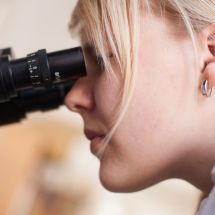
Doctoral studies are necessary for building a successful career as a scientist. The most successful graduates of doctoral programs will become the leaders of large and influential research groups that extend the boundaries of human knowledge. Of course, not everyone can be a leader and collect awards. But even an “ordinary” doctorate from the University of Chemistry and Technology, Prague, is a sought-after credential for members of research groups. In the playing field of Czech science, the chemical disciplines are among the best evaluated and most fully competitive on the global stage. Professor Holý’s scientific and commercial successes in the treatment of HIV were not entirely coincidental. Chemistry as a science has a long tradition and an excellent level of quality in the Czech Republic, making graduates competitive at home and abroad. UCT Prague doctoral graduates have pursued careers all over the world.
UCT Prague has a long tradition in teaching in the fields of chemistry and chemical technology and is annually ranked among the leading institutions in these areas, both in the Czech Republic and abroad (see QS World University Rankings). Those interested in doctoral studies in English can find their research topic—ranging from traditional chemical and chemical-technological fields to new progressive areas, such as pharmacy, nanotechnology, bioinformatics, and biotechnology—in one of 17 study programs and eight double degree programs implemented in cooperation with international universities.
[poduzel] => Array ( ) [iduzel] => 59679 [canonical_url] => [skupina_www] => Array ( ) [url] => [sablona] => stdClass Object ( [class] => infotext [html] => [css] => [js] => [autonomni] => 0 ) ) [59680] => stdClass Object ( [nazev] => Stories of PhD students and postdocs [seo_title] => Stories of PhD students and postdocs [seo_desc] => [autor] => [autor_email] => [obsah] =>Obsah viz podřízené položky + složka novinky
[urlnadstranka] => [ogobrazek] => [pozadi] => [poduzel] => stdClass Object ( [59681] => stdClass Object ( [obsah] => [iduzel] => 59681 [canonical_url] => _clone_ [skupina_www] => Array ( ) [url] => /prospective-students/why-choose-uct-prague/stories-of-phd-students-and-postdocs/seznam_clone_38035 [sablona] => stdClass Object ( [class] => novinky [html] => [css] => [js] => [autonomni] => 1 ) ) [61852] => stdClass Object ( [nazev] => Bukola Lois Ojobe [seo_title] => Bukola Lois Ojobe [seo_desc] => [autor] => [autor_email] => [perex] => [ikona] => [obrazek] => [ogobrazek] => [pozadi] => [obsah] =>
Tell us something about yourself:
I am an introvert who loves her space but is curious enough to venture out when it is needed. This curiosity made me love science, delve into research, and love it.
What do you like most about working as a scientist?
The unpredictability of science. The thrill of science is like a game of cards; you do not know what hand you will be dealt. Every day is a new day with a lot of unpredictability, and it feeds my curiosity. To sum it all up, when I achieve scientific feats that I thought were impossible when I started researching science, it makes me glad to be a scientist.
What do you consider to be your greatest achievement(s) so far?
Choosing to go into research. I had dabbled in the corporate world for a few years. After a while, I decided to move into science I was passionate about. I consider deciding to move back into research and all the things I had to do to get here my greatest achievement. Other things come close; writing my first paper was also an achievement; I pat myself on the back sometimes when I remember. It is not published yet, but I am still proud of myself.
Why did you decide to study at UCT Prague?
Everyone asks me: “Why Prague?” I say that I did not choose Prague but that I chose UCT Prague (the university). UCT Prague had the research line I was passionate about (wastewater technology) and had the facilities (personnel and infrastructure) I needed to thrive in this field.
Do you enjoy living in Prague?
Hmm… I feel I am too much of an introvert to live in Prague. Truth be told, I treat Prague as I would treat any other part of the world. I might be a curious cat, but I have not ventured into sightseeing as much as I would have loved. Prague is lovely from the little I have seen so far.
What would you say to those who are thinking about doing a PhD at UCT Prague?
If you are strong-willed, a PhD at UCT Prague would be the right place for you to do your research. Remember that the Czech Republic is not an English-speaking country. However, you cannot compare the non-academic arena with UCT Prague. It is still a little challenging to communicate with people who are not bilingual. The resources the school provides are mostly in the Czech language, but this trend is changing. It is nothing that Google translate cannot help you with.
[urlnadstranka] => /prospective-students/why-choose-uct-prague/stories-of-phd-students-and-postdocs [iduzel] => 61852 [canonical_url] => [skupina_www] => Array ( ) [url] => /prospective-students/why-choose-uct-prague/stories-of-phd-students-and-postdocs/bukola-lois-ojobe [sablona] => stdClass Object ( [class] => stranka_submenu [html] => [css] => [js] => [autonomni] => 1 ) ) [61853] => stdClass Object ( [nazev] => Charlie Maslen [seo_title] => Charlie Maslen [seo_desc] => [autor] => [autor_email] => [perex] => [ikona] => [obrazek] => [ogobrazek] => [pozadi] => [obsah] =>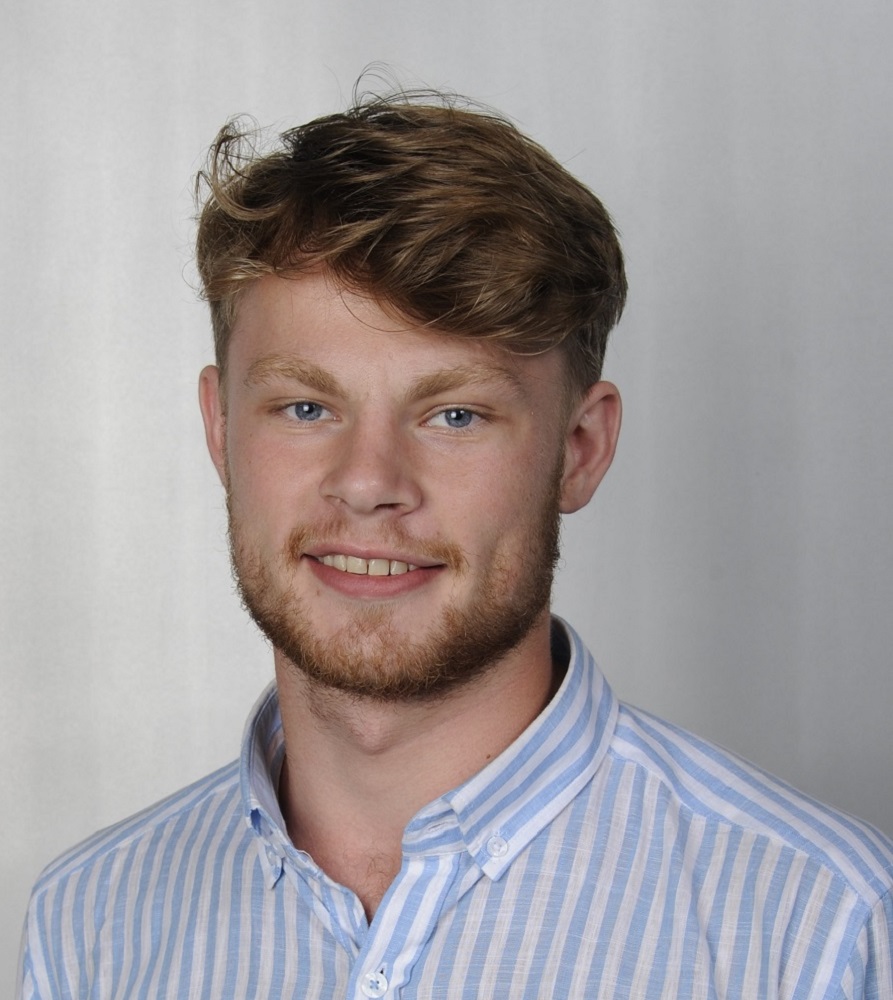
Tell us something about yourself:
I am a British student in the 3rd year of the Chemical and Process Engineering PhD programme. My research is on developing micro-actuators and micro-robots using responsive hydrogels as a construction material.
What do you like most about working as a scientist?
I like the freedom and independence to work on various projects, individually and within groups. I love how my research requires a balance of academic and practical skills, but my guilty pleasure is grafting through the final stages of a paper before submission.
What do you consider to be your greatest achievement(s) so far?
I would say my greatest achievement so far was my first publication. The work began with my master’s thesis in the Netherlands and ended here in Prague. Now I am here and there are many more projects that have spun off from it.
Why did you decide to study at UCT Prague?
I was offered the chance to continue my master’s thesis research, done in the Netherlands, with my supervisor here in Prague.
Do you enjoy living in Prague?
Absolutely! Prague is my favourite city that I have lived in. Aside from the beautiful centre, there are plenty of lively neighbourhoods to settle in, each with a distinct vibe.
What would you say to those who are thinking about doing a PhD at UCT Prague?
Go for it! Prague is an amazing city and there are many interesting and unique research groups here at UCT Prague. Depending on your previous experience, the difference in organizational style might be a shock (oh, that sweet bureaucracy!). However, there are plenty of helpful colleagues and receptionists to help you on the way.
[urlnadstranka] => /prospective-students/why-choose-uct-prague/stories-of-phd-students-and-postdocs [iduzel] => 61853 [canonical_url] => [skupina_www] => Array ( ) [url] => /prospective-students/why-choose-uct-prague/stories-of-phd-students-and-postdocs/charlie-maslen [sablona] => stdClass Object ( [class] => stranka_submenu [html] => [css] => [js] => [autonomni] => 1 ) ) [61851] => stdClass Object ( [nazev] => Aleksandra Ilic [seo_title] => Aleksandra Ilic [seo_desc] => [autor] => [autor_email] => [perex] => [ikona] => [obrazek] => [ogobrazek] => [pozadi] => [obsah] =>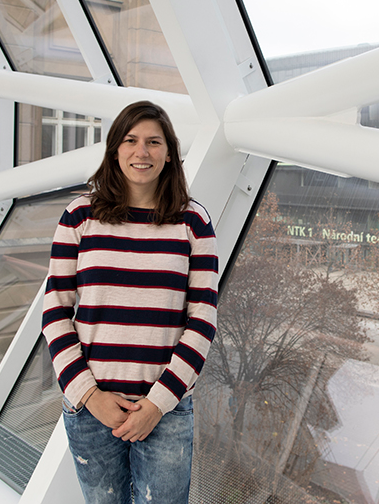
Tell us something about yourself:
I come from Serbia and I am a 5th year PhD student working on techniques to measure trace metals, which are needed for the optimal anaerobic digestion process.
What do you like most about working as a scientist?
The flexibility, independency, and knowledge-driven work and way of thinking.
What do you consider to be your greatest achievement(s) so far?
On one hand, staying close to my family and friends in my home country of Serbia. On the other hand, having colleagues and friends from all over the world, which I got to know in the last 8 years living abroad.
Why did you decide to study at UCT Prague?
I liked the topic and the whole Marie Curie fellowship PhD programme (SuPER-W) in which UCT Prague was taking part.
Do you enjoy living in Prague?
Yes. The size of the city is just right for me and it has a good balance of urban and natural areas.
What would you say to those who are thinking about doing a PhD at UCT Prague?
Prague is a great city to live in. Even after more than four years living here, I have never run out of new activities to try when I have felt like it. Furthermore, the Czech Republic has many beautiful natural spots and numerous cities with cultural heritage. There are still things for me to discover and experience (e.g., skiing and mushroom hunting!). At UCT Prague, I got to work with very hard-working students and motivated researches who are experts in their fields. Of course, as with studying anywhere abroad, studying at UCT Prague has challenged me personally in terms of getting the hang of the Czech language, understanding the working culture, and adapting as a foreigner.
[urlnadstranka] => /prospective-students/why-choose-uct-prague/stories-of-phd-students-and-postdocs [iduzel] => 61851 [canonical_url] => [skupina_www] => Array ( ) [url] => /prospective-students/why-choose-uct-prague/stories-of-phd-students-and-postdocs/aleksandra-ilic [sablona] => stdClass Object ( [class] => stranka_submenu [html] => [css] => [js] => [autonomni] => 1 ) ) [61854] => stdClass Object ( [nazev] => M. Isabel Agea Lorente [seo_title] => M. Isabel Agea Lorente [seo_desc] => [autor] => [autor_email] => [perex] => [ikona] => [obrazek] => [ogobrazek] => [pozadi] => [obsah] =>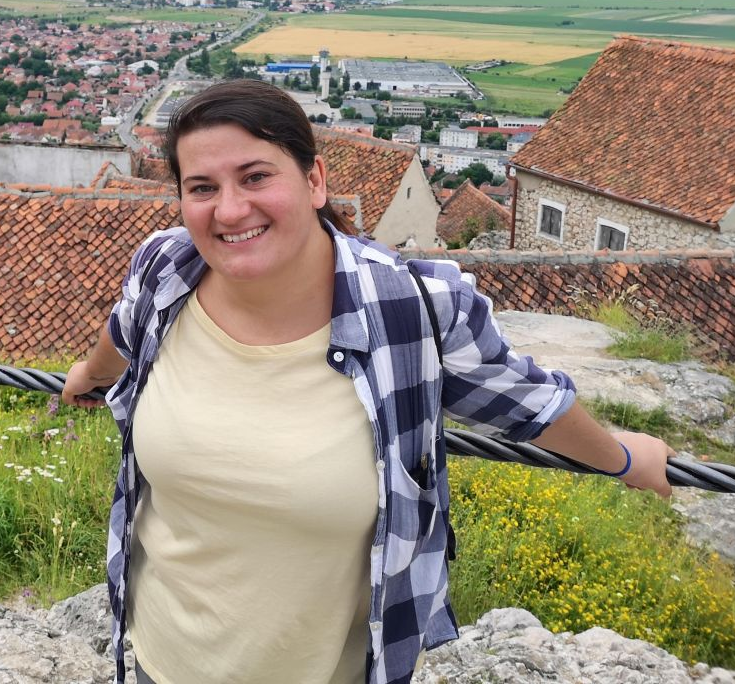
Tell us something about yourself:
I have more names and surnames than the Czech system can deal with! For real though, I am just a common girl who likes beer, travelling, computers, reading, sports… Pretty easy-going but also quite stubborn. I love my family and, although I prefer colder weather, I go visit them any time I can. I like to be updated with what is going on in the world and learn about it. I would also love to live in more countries before settling down somewhere.
What do you like most about working as a scientist?
I guess it would be, as is for every scientist, discovering the answers to your questions. I think that is a feeling that cannot be described. And to be more precise, I work with programming but my background is biological so making my code work and implementing it really makes my day.
What do you consider to be your greatest achievement(s) so far?
I am Spanish and it is very hard there to find a job in your field. It does not matter if it is science or not. However, it is even harder for young scientists because most of us have to make our living from public grants and the national budgets for science in Spain are very low. So, to me, being able to live as a scientist is my greatest achievement. It may not seem like a lot but most of my university classmates did not make it.
Why did you decide to study at UCT Prague?
While I was working on my master’s thesis in Barcelona, I met Petra Karnetová who was promoting the ‘Study in Prague’ programme. I was looking for a PhD in Bioinformatics and she did not know anything about that but she looked into it and gave me a name and an e-mail to contact. Then she started talking about Prague and the Czech Republic in general. After that, I created an Excel file with my PhD possibilities and Prague hit the first position quickly. The beer price, the level of laicism and, most importantly, the passion that Petra transmitted while talking about the city and the quick and nice response of my, nowadays, supervisor. Besides that, looking at the map it was clear that Prague is at the centre of Europe, with so many weekend trip possibilities. Those factors made my choice very easy.
Do you enjoy living in Prague?
I sure do! Google was right about the beer price… It increased since I moved to Prague in 2016 but it is still super decent. I love Prague and I think it is the most beautiful city in Europe. It has history, nature, sun, snow... I think it is really easy to fall in love with Prague and with the Czech Republic in general. I, personally, was amazed by the amount of big forests in the city. I am from the southeast of Spain. I live near the beach and the temperatures are always high so we do not have such nature. Prague does and it also showed me to differentiate seasons and feel what it is to live below 0 ºC, which is something that I enjoy a lot.
What would you say to those who are thinking about doing a PhD at UCT Prague?
I think that the university should not be as important but instead which group, supervisor, and project. I have been super lucky with that and all I can say about UCT Prague from my experience is that every principal investigator I have met here is awesome. So, if you are thinking about coming to UCT Prague as a PhD student and you like the project you will be working on, I am pretty sure you will be fine here. What I would suggest is to talk with another PhD student from that group beforehand. Just keep in mind that if it does not work then you can always change the destination or the project.
[urlnadstranka] => /prospective-students/why-choose-uct-prague/stories-of-phd-students-and-postdocs [iduzel] => 61854 [canonical_url] => [skupina_www] => Array ( ) [url] => /prospective-students/why-choose-uct-prague/stories-of-phd-students-and-postdocs/m-isabel-agea-lorente [sablona] => stdClass Object ( [class] => stranka_submenu [html] => [css] => [js] => [autonomni] => 1 ) ) [61842] => stdClass Object ( [nazev] => Ing. Tomáš Zimmermann [seo_title] => Ing. Tomáš Zimmermann [seo_desc] => [autor] => [autor_email] => [perex] => [ikona] => [obrazek] => [ogobrazek] => [pozadi] => [obsah] =>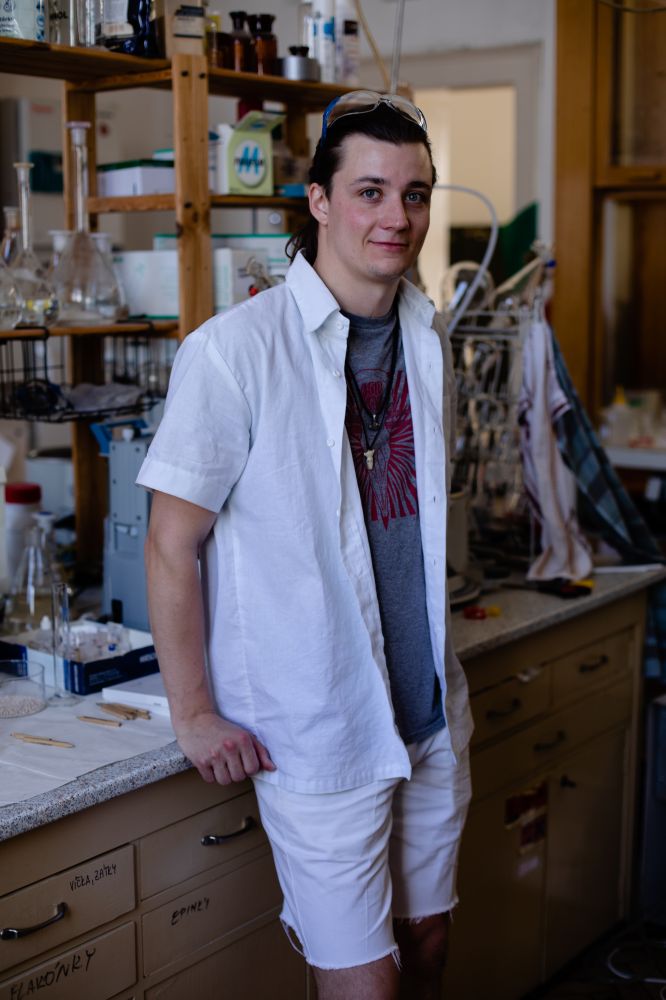
Tell us something about yourself:
I graduated with a bachelor’s degree from the FPBT at UCT Prague in Biotechnology of Pharmaceuticals and I continued in my studies to obtain a master’s degree in Chemistry of Natural Compounds. I now study in the doctoral programme of Organic Chemistry in the group of prof. Pavel Drašar. In the 2nd year of my doctoral studies, I was on an internship with the group of prof. Soren Christensen at the University of Copenhagen (UCPH) in Denmark. I received the award for the best oral presentation at the 24th Conference on Isoprenoids from the European Phytochemical Society.
What do you like most about working as a scientist?
The possibility of doing creative and interesting work regarding important issues like novel cancer treatment development amongst others. Furthermore, you can typically adjust your working hours to fit your preferences.
What do you consider to be your greatest achievement(s) to date?
Publishing articles, mainly about the work I did in Denmark, as well as a certain independence after an internship abroad and higher confidence in doing the work myself. We also tried to apply for patent protection for the results of work from Denmark, which was unfortunately rejected due to the lack of results (animal tests, etc.) confirming our hypothesis. I also enjoy following the development of the people I taught in the laboratory and their progress and acquired at least partial independence after only a few months from the introduction to the complete basics of laboratory work.
Why do you prefer science to the commercial sphere?
The work of a scientist was fulfilling for me and I was not sure if I could do such an interesting and meaningful job in some company, even though it is true that primary research is a long-term commitment with uncertain results. I also wanted to have time for my other activities such as playing with a band.
What would you say to those who are thinking about doing a PhD at UCT Prague?
It is definitely a very good choice if you also think carefully about the financial side of things as well as the workload, or the opportunity to travel abroad for an internship. It is therefore good to think carefully about who you will be most satisfied with in these respects with a view to the next 4 years. The university also gives one the opportunity to lead students in the laboratory and teach various subjects, which can be a valuable experience for the next professional life.
[urlnadstranka] => /prospective-students/why-choose-uct-prague/stories-of-phd-students-and-postdocs [iduzel] => 61842 [canonical_url] => [skupina_www] => Array ( ) [url] => /prospective-students/why-choose-uct-prague/stories-of-phd-students-and-postdocs/tomas-zimmermann [sablona] => stdClass Object ( [class] => stranka_submenu [html] => [css] => [js] => [autonomni] => 1 ) ) [61841] => stdClass Object ( [nazev] => Ing. Soňa Vytykáčová [seo_title] => Ing. Soňa Vytykáčová [seo_desc] => [autor] => [autor_email] => [perex] => [ikona] => [obrazek] => [ogobrazek] => [pozadi] => [obsah] =>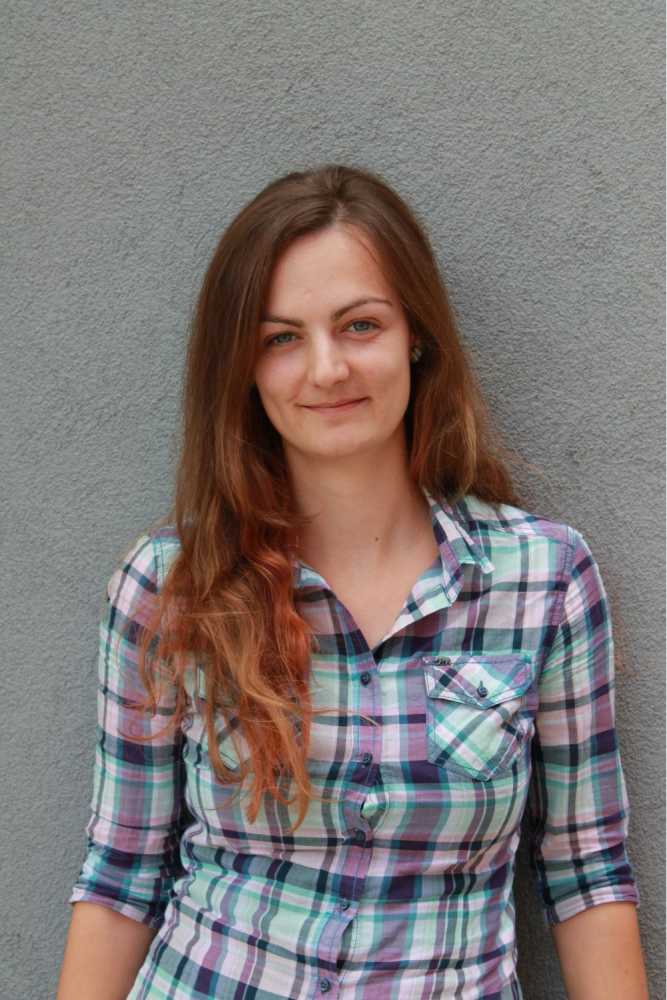
Tell us something about yourself:
I studied Chemistry and Chemical Technology at UCT Prague with a focus on Inorganic Chemistry. I now continue as a postgraduate with a double doctorate at UCT and IPE (Institute of Photonics and Electronics Czech Academy of Science). During my studies, I have been awarded by the Preciosa and Crytur companies (my master’s thesis and scientific activities). My thesis was also presented at „Diplomky na stojáka“ project.
What do you like most about working as a scientist?
I enjoy teaching and I'm glad I had the opportunity to try it out as part of my doctorate. I also enjoy the diversity of this work – I can learn many methods, work with numerous devices, interpret measured data, etc. It is rewarding to devise practical solutions regarding different measurements and experiments. For me, working in a lab is more interesting than working on a computer.
What do you consider to be your greatest achievement(s) to date?
My students say that my lessons were not a waste of their time :)
Why do you prefer science to the commercial sphere?
I have had the opportunity to work at the Academy of Science. I wanted to try scientific work and teaching.
What would you say to those who are thinking about doing a PhD at UCT Prague?
If you want to try it, do it. It is easier to do it immediately after the master’s study; you know other students, professors, the university... There are also good possibilities for studying and living abroad. Furthermore, it is always better to try something now than regret that you did not do it later.
[urlnadstranka] => /prospective-students/why-choose-uct-prague/stories-of-phd-students-and-postdocs [iduzel] => 61841 [canonical_url] => [skupina_www] => Array ( ) [url] => /prospective-students/why-choose-uct-prague/stories-of-phd-students-and-postdocs/sona-vytykacova [sablona] => stdClass Object ( [class] => stranka_submenu [html] => [css] => [js] => [autonomni] => 1 ) ) [61847] => stdClass Object ( [nazev] => Ing. Petr Vozka Ph.D. [seo_title] => Ing. Petr Vozka Ph.D. [seo_desc] => [autor] => [autor_email] => [perex] => [ikona] => [obrazek] => [ogobrazek] => [pozadi] => [obsah] =>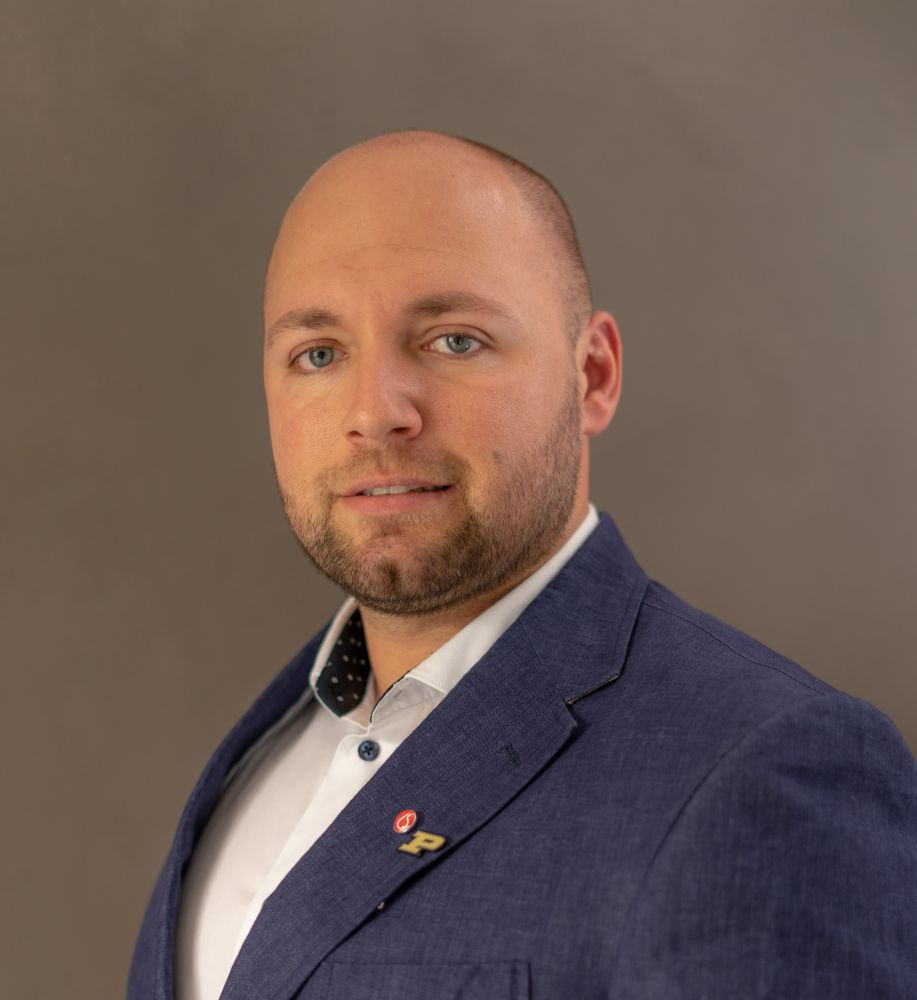
Tell us something about yourself:
I graduated with a bachelor’s degree in Chemistry and Chemical Technology in FCHT at UCT Prague. I then obtained a master’s degree in Chemistry and Technology of Fuels and the Environment in FTOP at UCT Prague. I started my doctoral studies in FTOP (Chemistry and Technology of Fuels and the Environment). I completed it at Purdue University, USA, Engineering Technology, focusing on the analysis of alternative aviation fuels for the US Navy. I am currently a Post-Doctoral Research Assistant at Purdue University, USA. We are working with the US Navy to implement the fuel analysis methods I have developed at the US Navy base. I accepted an offer as an Assistant Professor at California State University in Los Angeles. During my master’s degree in the Czech Republic, I received the Unipetrol Award (2013 and 2014) and “Dobrý list komory” (2013 and 2014) for excellent study outcomes. In the United States, I received an ASTM International Graduate Scholarship ($10,000) in 2019 and a post-doctoral scholarship from the Office of Naval Research in the same year.
What do you like most about working as a scientist?
Scientific work covers a vast range of activities, and the work on each of the projects is diverse. I especially enjoy the fact that one is constantly learning new things and gaining unique experiences. In addition, learning new things involves working with more experienced scientists from many different disciplines and cultures. Furthermore, I am delighted that these collaborations give rise to new ideas that allow me to work on innovative experiments, which leads to the fact that as a scientist, I am at the center of everything I have just read about. Today, people can read about my work, and that is a great feeling.
What do you consider to be your greatest achievement(s) to date?
When I think about my academic achievements, I can think of a successful doctorate degree at one of the top universities in the United States, collaborations with leading scientists in my field, several articles in important journals, or even a patent for one of my methods. But if I should generalize, as my personal greatest success, I perceive that I do what I enjoy and that I do not have to force myself to go to work/laboratory, and that I don't see the work of a scientist as a reason to get paid at the end of the month but as a privilege.
Why do you prefer science to the commercial sphere?
I have been gravitating towards science since primary school. I was always interested in how things work and especially why. Humanity has a massive impact on the environment and energy resources of our planet. Therefore, it is crucial to find solutions for the challenges that society is facing. The commercial sphere is usually fueled by economic gain, whereas science serves people, or at least it should. I prefer science (in the academic sense) because I would like to work on something that would help people or bring valuable something regardless of the profit.
What would you say to those who are thinking about doing a PhD at UCT Prague?
The world needs you! None of the current problems will solve themselves, whether it is food production, waste disposal, polluted air, or drugs for all kinds of diseases. Being a scientist is a privilege and a wonderful thing. Sometimes people are not clear about what "being a scientist" means or what such a scientist does. The same goes for the doctorate. I have often heard the claim that a doctorate is only good if you want to be a professor (teacher). Please do not believe it and do not be discouraged. In addition to becoming an expert in the field, doctoral studies also develop critical thinking, the ability to solve problems effectively, and the ability to collaborate and lead. From my point of view, these are the most important aspects that will help you achieve a successful career, as they are the most sought after in today's modern times. In addition, lifelong learning contributes to personal fulfillment and satisfaction. UCT Prague is one of the best universities in the Czech Republic. One of the best scientists I have worked with and still work with at UCT Prague. If you are deciding on a doctorate at UCT Prague, do not hesitate. I had the opportunity to compare my doctoral studies at UCT Prague with one of the best universities in the USA, and I am very proud of what UCT Prague is doing. UCT Prague has more than perfectly prepared me to be a successful scientific candidate on a global scale.
[urlnadstranka] => /prospective-students/why-choose-uct-prague/stories-of-phd-students-and-postdocs [iduzel] => 61847 [canonical_url] => [skupina_www] => Array ( ) [url] => /prospective-students/why-choose-uct-prague/stories-of-phd-students-and-postdocs/petr-vozka [sablona] => stdClass Object ( [class] => stranka_submenu [html] => [css] => [js] => [autonomni] => 1 ) ) [61838] => stdClass Object ( [nazev] => Ing. Petra Jánská [seo_title] => Ing. Petra Jánská [seo_desc] => [autor] => [autor_email] => [perex] => [ikona] => [obrazek] => [ogobrazek] => [pozadi] => [obsah] =>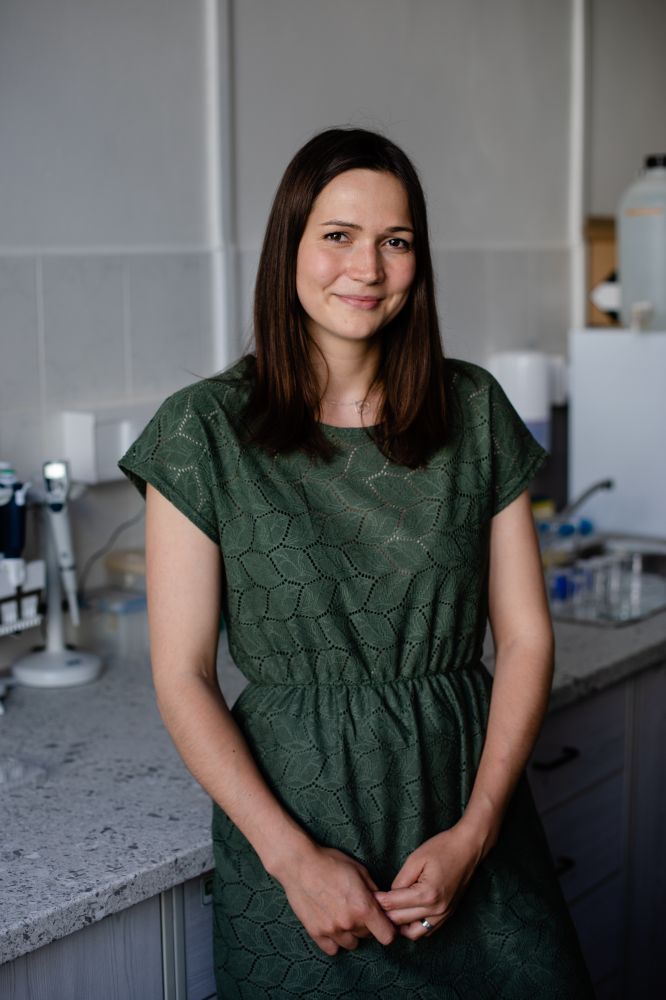
Tell us something about yourself:
I come from Potvorov, which is a small village in the Plzeň region. I graduated with a bachelor’s degree in Micro and Nano Technologies in Chemical Engineering (2011–2014). I spent one year of my studies at the Catholic University of Leuven, Belgium (2014–2015) through the Erasmus+ programme and then I completed a master’s degree in Chemical Engineering and Bioengineering (2014–2017) at UCT Prague. I am currently working and studying in the Chemical and Process Engineering doctoral study programme.
What do you like most about working as a scientist?
During my studies, I participated in several internships abroad. In 2016, I dealt with the development and quality control of protective sun creams at Universidade Estadua, Câmpus de Araraquara in Brazil. In 2019, I got a place at McGill University in Canada where I tested an enzyme-substrate system and its antibacterial effects.
What do you consider to be your greatest achievement(s) to date?
During my studies, I received the Crytur award for the best diploma thesis (2017) and I also received the award of the sponsor Medicem technology s.r.o. at the student scientific conference (2013).
Why do you prefer science to the commercial sphere?
Working in research has broadened my horizons, helped me penetrate the scientific sphere and find the direction I want to take in the future. I am surrounded by people who understand their work and sacrifice a lot of their time. However, the reward for maximum effort is a result that is important not only for themselves but also for society as a whole. The reward for the maximum effort is then a result, that is relevant not only for them, but for the whole society. The desire to know and invent new things unites members of the academic community and moves forward not only them but also humanity as such. I am proud to be part of a project that focuses on the production of an antibacterial agent that is the product of a reaction between an enzyme and a substrate. Using special techniques, we store the enzyme and substrate separately. Based on the selected impulse, they are released, react with each other and form an active substance, which then acts at the site of need.
What would you say to those who are thinking about doing a PhD at UCT Prague?
After successfully completing my master's degree, I preferred science to the commercial sphere, because I was inspired by the environment in which I worked on my diploma thesis. I enjoyed working with colleagues, the opportunity to travel and explore the science and research environment in other countries, and the exchange of information and experience. An important incentive to apply for doctoral studies was a recommendation from Professor Štěpánek, under whose guidance I am very happy to work. If you are considering enrolling in a doctoral degree, I highly recommend it. This will give you a unique opportunity to work with extremely intelligent people, in an environment that motivates you to constantly improve and work as best you can to achieve the set goal.
[urlnadstranka] => /prospective-students/why-choose-uct-prague/stories-of-phd-students-and-postdocs [iduzel] => 61838 [canonical_url] => [skupina_www] => Array ( ) [url] => /prospective-students/why-choose-uct-prague/stories-of-phd-students-and-postdocs/petra-janska [sablona] => stdClass Object ( [class] => stranka_submenu [html] => [css] => [js] => [autonomni] => 1 ) ) [61840] => stdClass Object ( [nazev] => Ing. Martin Tlustý [seo_title] => Ing. Martin Tlustý [seo_desc] => [autor] => [autor_email] => [perex] => [ikona] => [obrazek] => [ogobrazek] => [pozadi] => [obsah] =>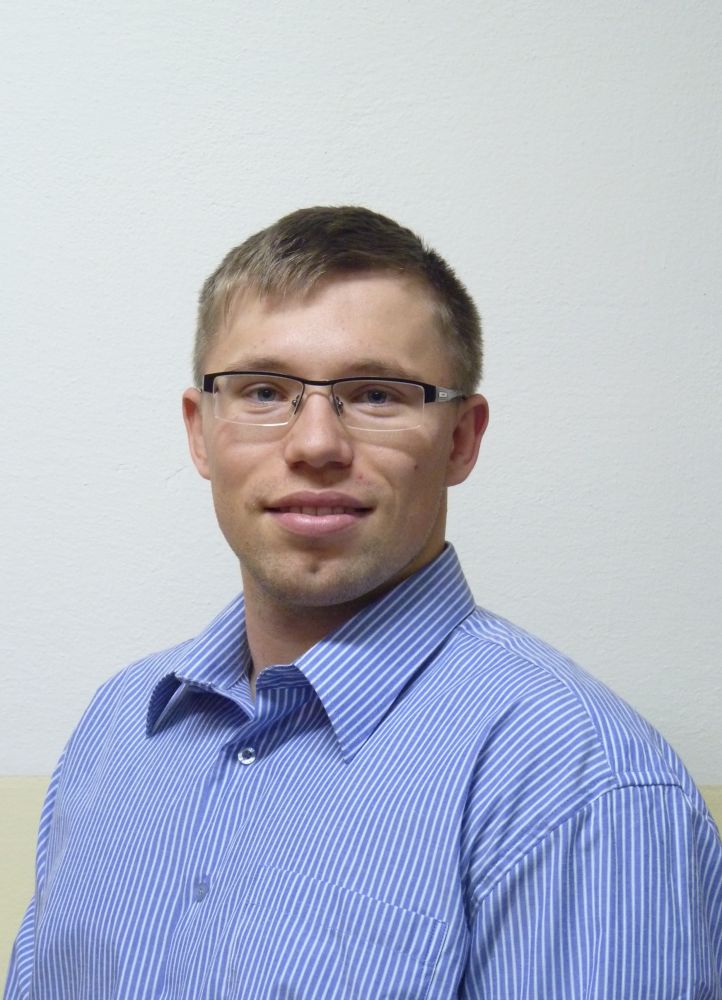
Tell us something about yourself:
I studied Organic Chemistry at UCT Prague. I am now doing my doctoral studies at the Department of Organic Chemistry under the supervision of professor Lhoták, where I focus on the synthesis of new inherently chiral calixarenes. As part of my studies, I completed an internship at Zentiva, k.s. In 2017, I won 2nd place in the Synthon award competition for the best diploma thesis in the field of Organic Chemistry.
What do you like most about working as a scientist?
I enjoy the freedom and opportunity to implement my ideas. In my work, new questions that need to be answered are always emerging. I really like looking for solutions to these problems. In addition, I highly value the opportunity to participate in international conferences all over the world. Personally, I have already visited China, France and Taiwan.
What do you consider to be your greatest achievement(s) to date?
I value most the 2nd place in the Synthon award competition for my diploma thesis in the field of Organic Chemistry. I also consider as an achievement each one of my six published research papers. Furthermore, I cannot omit my pedagogic activity; some of my students grew to like organic chemistry so much that they started to study it at our department.
Why do you prefer science to the commercial sphere?
I think you can go into the commercial sphere at any time. Companies are constantly looking for new employees to strengthen their ranks. On the other hand, once a person falls out of science, it is very difficult to return to it. I also have examples in my family; both my father and brother work in academia and both of them are content about their life.
What would you say to those who are thinking about doing a PhD at UCT Prague?
If you find a good supervisor and project that is interesting for you then go for it. A doctorate at UCT Prague will help you to start your research career as a scientist.
[urlnadstranka] => /prospective-students/why-choose-uct-prague/stories-of-phd-students-and-postdocs [iduzel] => 61840 [canonical_url] => [skupina_www] => Array ( ) [url] => /prospective-students/why-choose-uct-prague/stories-of-phd-students-and-postdocs/martin-tlusty [sablona] => stdClass Object ( [class] => stranka_submenu [html] => [css] => [js] => [autonomni] => 1 ) ) [61844] => stdClass Object ( [nazev] => Ing. Marek Lanč Ph.D. [seo_title] => Ing. Marek Lanč Ph.D. [seo_desc] => [autor] => [autor_email] => [perex] => [ikona] => [obrazek] => [ogobrazek] => [pozadi] => [obsah] =>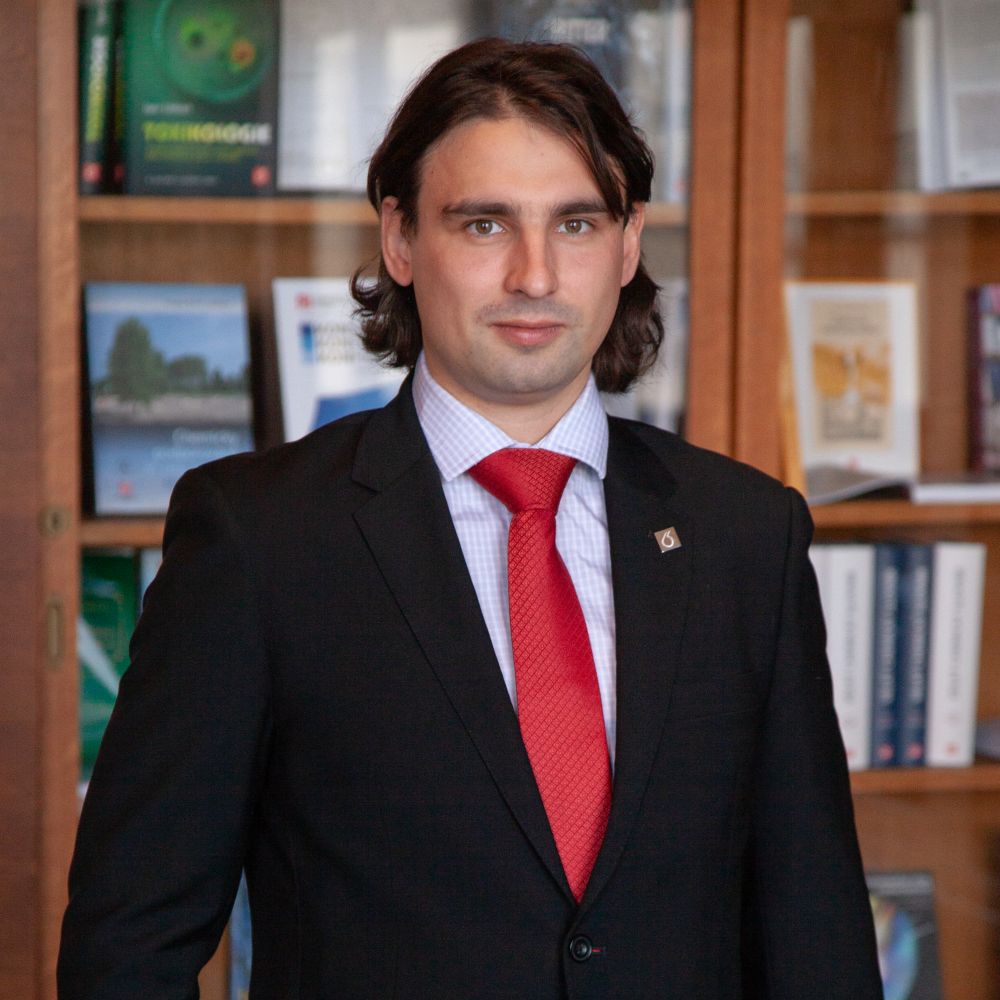
Tell us something about yourself:
I began with my studies at the primary school Třešť and continued at GOB and SOŠ Telč. I graduated with a bachelor’s degree in Chemistry at UCT Prague, and from both the Physical Chemistry master’s and doctoral study programmes (also at UCT Prague). Out of curiosity and the desire to sniff out more humanely tuned subjects, I added to the doctorate and successfully completed the bachelor's degree in Teaching Vocational Subjects. I have already officially graduated. But there is still something to learn, so right now I'm studying the possibilities and principles of applying thin active (bio)films on polymeric materials. Since the 2nd year of my studies at UCT Prague, I have been participating in projects in the Laboratory of Membrane Separation Processes (Doc. Friess, Department of Physical Chemistry, FCHI, UCT Prague). As part of internships abroad, I worked for 6 months at the ITM-CNR membrane institute in Italy and for 5 months at the FujiFilm research center in the Netherlands. Now I am partially employed at the Institute of Physical Chemistry of the Institute of Chemical Technology in Prague as an assistant professor and at the same time I lead membrane research in the R&D startup CCORE Technology GmbH in Vienna. From my high school years, I would mention the Recognition of the City of Telč, which reflected a number of successful placements at the Science and Technology Olympiads. For my diploma thesis dealing with polymers with internal microporosity, I was awarded the Unipetrol Award, the Crytur Award 2014, the Werner von Siemens Award and the Josef Hlávka Award. In the field of popularization, I was awarded the Audience Award and the Award of the British Council and the civic association ADETO within the Famelab ČR competition, and the Audience and Jury Prize in the Science Section of “Diplomky na stojáka”. As part of the conference presentations, I received the European Membrane Society Travel Award, the Journal of Applied Polymer Science Poster Prize and the Student Poster Presentation Award at the Advanced Membrane Technology VII Conference four times (Cork, Ireland), the Rector’s Award of UCT Prague for the best lecture at the Mempur conference in Pardubice, the Dekonta a.s. for interesting work on environmental issues at the CHISA conference. For the excellent promotion of UCT Prague and the representation of students, I was awarded the Rector's Award of UCT Prague and at the end of my studies I received the Award of the Minister of Education in 2018.
What do you like most about working as a scientist?
I enjoy the freedom in designing solutions, which is only limited by the laws of nature. Unfortunately, it seems to me that this natural effort to discover how the nature works that scientists have is spoiled by wrong evaluation and financing system. That often leads to a diluted and populist approach, which lowers the practical or fundamental value of the published information. The information is sometimes published only to assure further financing, even though more research and verification should be done. Unfortunately, I am usually not patient, so I am more susceptible to this than many other scientists are. Therefore, right now I gravitate more towards the applied research. Where “unfortunately” the freedom is partially restricted by the reality, such as time availability, applicability and last but not least the affordability. Despite that, such work is full of improvisation, being at the edge of the knowledge and it is highly competitive on an international scale, which enables to get to know many interesting people and countries.
What do you consider to be your greatest achievement(s) to date?
Combining science, student and family life. Contributing a few pieces of the puzzle to explain the aging and separation properties of polymers with internal microporosity, which offer unique properties for membrane separation of gases and vapors; co-founding of the Association of Student Clubs and Senates at UCT Prague; and the birth of my son (even though I did not directly participate in his birth).
Why do you prefer science to the commercial sphere?
As the first step towards science, I decided to pursue a doctorate due to the opportunity to work creatively. I am currently on the border between the academic and commercial spheres, because I think it is important that researchers and teachers at the university have experience in industry so that they can prepare students with a more comprehensive view of the matter. And there I see my future over time…
What would you say to those who are thinking about doing a PhD at UCT Prague?
If you are not sure if you would rather go work outside academia, a year in industry on your CV and then a completed doctorate is still better than a year of an unfinished doctorate. If you decide to pursue a doctorate, then be careful when you are choosing your future workplace. It is definitely not wrong to do a doctorate under a different supervisor than you had during your previous studies. This decision will influence your life for at least :-) four years. Therefore, it is important that you click not only with the research topic but with the supervisor and workplace (ask current students). Finally yet importantly, your financial situation should be taken care of, which means additional financing from research grants. The necessity of having a part-time job outside your studies would definitely not help you to finish your doctorate earlier.
[urlnadstranka] => /prospective-students/why-choose-uct-prague/stories-of-phd-students-and-postdocs [iduzel] => 61844 [canonical_url] => [skupina_www] => Array ( ) [url] => /prospective-students/why-choose-uct-prague/stories-of-phd-students-and-postdocs/marek-lanc [sablona] => stdClass Object ( [class] => stranka_submenu [html] => [css] => [js] => [autonomni] => 1 ) ) [61845] => stdClass Object ( [nazev] => Ing. Lucie Pokorná Ph.D. [seo_title] => Ing. Lucie Pokorná Ph.D. [seo_desc] => [autor] => [autor_email] => [perex] => [ikona] => [obrazek] => [ogobrazek] => [pozadi] => [obsah] =>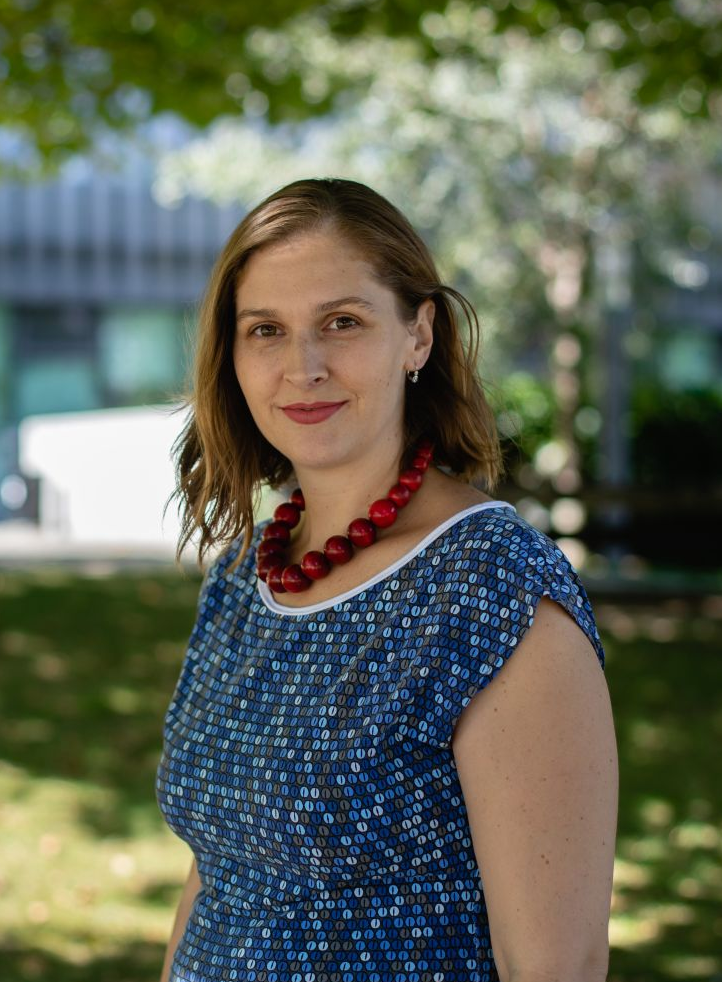
Tell us something about yourself:
I studied at the University of Chemistry and Technology in Prague (UCT Prague) - bachelor and master in the field of Water Technology (program Chemistry and Technology of Environmental Protection). As for the doctoral studies, I did a joint PhD - double degree at UCT Prague (under the guidance of prof. Pavel Jeníček and assoc. prof. Jan Bartáček) and Ghent University (prof. Eveline Volcke). I defended my doctorate in September 2017. Currently, I am on maternity leave so I have a six-month break. Nevertheless, I am still cooperating with the Department of Water Technology and Environment Engineering. During my studies, I worked for several years in the summer as a laboratory assistant in the company Barvy a laky Hostivař and then as an assistant in the private company Consultations in Environmental Protection. Since defending my doctorate, I have been working at the Department of Water Technology and Environment Engineering. I am currently working as a REPARES project manager. This is the Horizon 2020 project on antibiotic resistance genes and bacteria. I was also in charge of the SuPER-W project, a European project of double doctorates dealing with the acquisition of resources, products, and energy from wastewater. Next to these projects, I also deal with science as such. In recent years, I have been trying to focus on mathematical modelling, specifically the process of microaeration (which is a biochemical method for removing hydrogen sulfide from biogas). We were the first to model this process and now we are trying to improve it. And last but not least, I am still in charge of the website at our department.
What do you like most about working as a scientist?
Apart from the fact that I enjoy discovering the undiscovered, I also like the fact that the work of a scientist is not monotonous. For a while, I read some literature, then I am writing articles or projects, after that I work in a laboratory or devote my time to students or I teach. I also have a great opportunity to travel. Every day is different and I am never certain what I am going to find out by my research, whom I will meet and where it will move me.
What do you consider to be your greatest achievement(s) to date?
I probably consider the fact that I managed to defend my dissertation with two very young children to be my greatest success to date. The second son was born when I had my dissertation ready for printing and defended it when he was less than two months old. In retrospect, when I think about it, it was really a very difficult period, which, of course, also had its advantages – there were no time to stress about the defense. Of course, I consider all my prizes and placements to be a success. It pushed me forward and gave me the feeling that it was the right choice for me to become a scientist and everything makes sense. And last but not least, I consider it a huge success that I still manage to bring my family and scientific work together. My husband (also working at UCT Prague) and I have three small children and some days are extremely demanding. However, thanks to my family, my husband, and the opportunity to work from home and part-time, it all works out. In addition, I consider this not only a huge success, but most of all I am really grateful for it.
Why do you prefer science to the commercial sphere?
When I was thinking about what to do next in my life, I liked the idea of continuing in the laboratory. I was attracted by the opportunity to travel abroad. During my master's degree, I was on Erasmus for half a year at a university in Milan and it was an invaluable experience. Yes, in many ways very hard, for example, I still do not understand how I could master four subjects in Italian, which I had studied for less than three months. However, it was also one of the best experiences, culturally and socially. The doctorate offered me both, a job in science and at the same time the opportunity to travel and broaden my horizons again. Which ended up being better than I had ever hoped. Not only because of a double doctorate (and a year spent in Belgium), but also because of an eight-month internship at the University of South Florida in Tampa, Florida.
What would you say to those who are thinking about doing a PhD at UCT Prague?
To think carefully if this is exactly what they want to do. Because no matter how much I enjoyed it and had the opportunity to travel, meet new people and learn, the whole doctorate is challenging. You have to sacrifice a lot of time, and if you apply for it just because you do not want to work yet, you will know it and you will most probably give it up after a while. However, if a person is determined, I can only tell them to persevere. During the first year, there will probably be a time when they will doubt it all when scientific enthusiasm will clash with reality. However, that moment will pass and with a little luck, the scientific enthusiasm will remain … And this is, in my opinion, worth it.
[urlnadstranka] => /prospective-students/why-choose-uct-prague/stories-of-phd-students-and-postdocs [iduzel] => 61845 [canonical_url] => [skupina_www] => Array ( ) [url] => /prospective-students/why-choose-uct-prague/stories-of-phd-students-and-postdocs/lucie-pokorna [sablona] => stdClass Object ( [class] => stranka_submenu [html] => [css] => [js] => [autonomni] => 1 ) ) [61839] => stdClass Object ( [nazev] => Ing. Lucie Peterková [seo_title] => Ing. Lucie Peterková [seo_desc] => [autor] => [autor_email] => [perex] => [ikona] => [obrazek] => [ogobrazek] => [pozadi] => [obsah] =>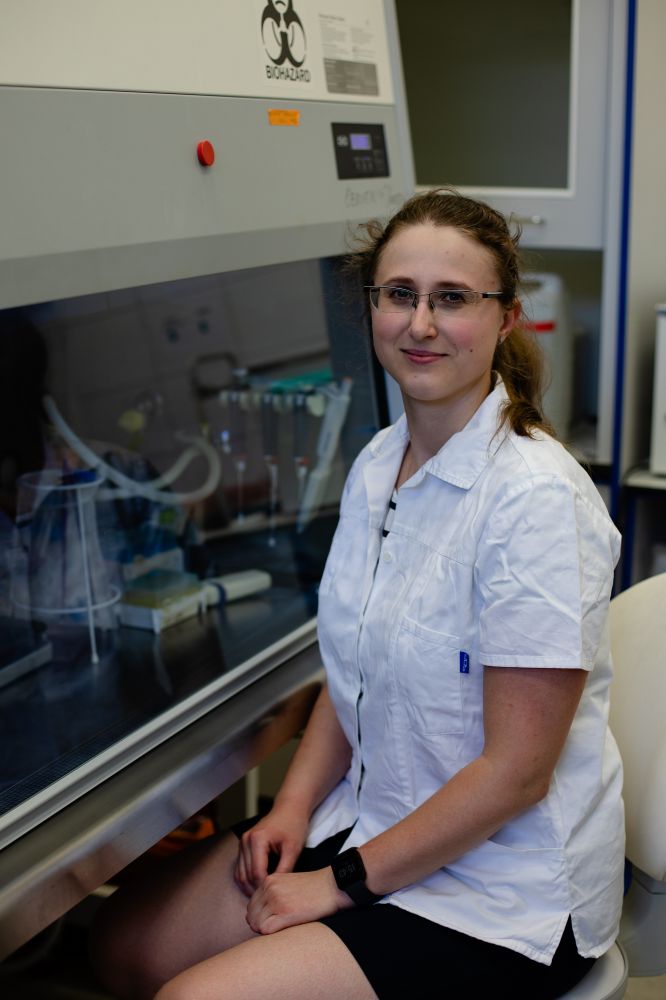 Tell us something about yourself:
Tell us something about yourself:
I completed a bachelor's degree in Biochemistry and Biotechnology and a master's degree in General and Applied Biochemistry at the Institute of Chemical Technology in Prague. In addition, the bachelor's programme of Teaching Special Subjects also at UCT Prague. During my master's degree, I spent one semester on Erasmus at the Technical University of Dresden. I am currently completing my doctoral studies in Biochemistry at UCT Prague. During most of my doctorate, I worked part-time at the Institute of Chemical Technology in Prague, in 2019 I started working at the Department of Pediatric Hematology and Oncology of the 2nd Medical Faculty of Charles University and the Motol University Hospital as a researcher. I completed both studies (Bc. And Mgr.) with a red diploma. For my diploma thesis I received the Dean's Award and the Hlávek Foundation Award. In 2019, I won 1st place in the Biomaterials section at the 19th Interdisciplinary Meeting of Life Scientists.
What do you like most about working as a scientist?
I enjoy the whole process from reading articles through planning the experiment, its implementation to its evaluation, especially if I perform all of it. I consider writing articles as the less entertaining part, although I enjoy working with language when all the facts are in place.
What do you consider to be your greatest achievement(s) to date?
As much as I enjoy most of the scientific process, there were sometimes moments in it when I got far beyond my comfort zone. So I consider my greatest professional success to be the fact that I'm still on the track and I didn't run away somewhere behind a desk to do paperwork or to routine diagnostics, although I would probably experience less intellectual frustration there. But that is said to simply belong to science…
Why do you prefer science to the commercial sphere?
At the end of my master's degree, it seemed to me that I could do better at science than at selling chemicals or working in a diagnostic laboratory. There are not many opportunities to do science in the commercial sphere in the Czech Republic in my fiel.
What would you say to those who are thinking about doing a PhD at UCT Prague?
The choice of institution is important, but I think it is more important to consider what to do with the doctorate in general. So: get as much information as possible about what awaits you throughout the doctorate (ideally also with a particular supervisor) and think about whether it is worth it. At the same time, expect that it will be a bit harder work than you expect, and it will probably take longer than you expect now. And also consider what to do with it then - will you want to continue in science (or even teach/lecture), or rather not? If not, you may not need to be tortured by a doctorate, and perhaps not going to a doctorate will make you happier and healthier. Or maybe you will find yourself in science. If you decide to go to UCT Prague, it is definitely not a bad place.
[urlnadstranka] => /prospective-students/why-choose-uct-prague/stories-of-phd-students-and-postdocs [iduzel] => 61839 [canonical_url] => [skupina_www] => Array ( ) [url] => /prospective-students/why-choose-uct-prague/stories-of-phd-students-and-postdocs/lucie-peterkova [sablona] => stdClass Object ( [class] => stranka_submenu [html] => [css] => [js] => [autonomni] => 1 ) ) [59699] => stdClass Object ( [nazev] => Ing. Katherine Villa [seo_title] => Ing. Katherine Villa [seo_desc] => [autor] => [autor_email] => [perex] => [ikona] => [obrazek] => [ogobrazek] => [pozadi] => [obsah] =>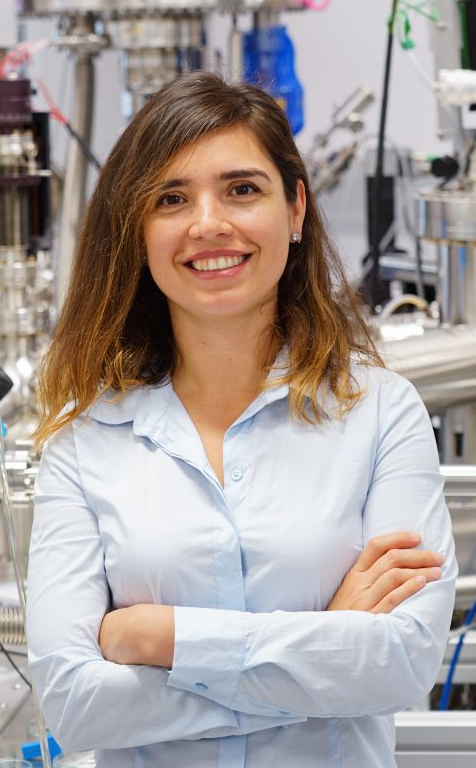
Tell us about yourself:
I received my bachelor’s degree in chemistry in Colombia. Then, I moved to Barcelona (Spain) where I received my PhD degree in Chemistry from the Autonomous University of Barcelona. I worked as a research assistant in Colombia. Then, I worked as a predoctoral researcher at the Autonomous University of Barcelona. After two postdoctoral research positions in Spain at the Catalonia Institute for Energy Research with Prof. Joan R. Morante and the Institute for Bioengineering of Catalonia with Prof. Samuel Sánchez, I joined the Center for Advanced Functional Nanorobots at University of Chemistry and Technology, Prague, where I’m currently working a senior scientist. Due to my expertise on photocatalytic processes, I got a PhD fellowship fully funded by the Autonomous University of Barcelona (UAB) to study the photocatalytic generation of hydrogen from wastewater for a four-year period.
What is the best to be a scientist?
In my opinion, the best to be a scientist is to discover new findings, understand how things work, contribute to solve global challenges, have fun at the lab and not being behind a desk the whole day!
What do you consider your greatest accomplishments/achievements?
Some of my major achievements include my research on the generation of H 2 from real wastewater under direct solar light irradiation at pilot-plant scale, which has demonstrated the feasibility of environmentally friendly technologies towards the production of solar fuels under real conditions. On the other hand, my works on the mechanistic studies on the photocatalytic conversion of methane into methanol have given a clear vision of the key parameters that should present the photocatalysts to boost the selectivity up to 50%, influencing the development of alternative materials ever since. As a senior scientist at the UCT, I have started a new sub-research line on the development of light-driven micromachines for environmental applications. For example, we showed the first example of metal-free bubble-propelled tubular micromotors that can be activated and controlled by visible-light irradiation, contributing to the development of more cost-effective devices for wastewater treatments. Furthermore, we recently developed light-driven BiVO 4 micromotors that show an autonomous ability to capture and deactivate pathogenic microorganisms. These new results hold the potential to revolutionize the field towards multifunctional micromachines that can sense the environment and achieve specific tasks.
Why do you prefer science to the commercial sphere?
I pursued a scientific career because it offers more flexibility not only in terms of time management but also in research topics. In industry, it usually consists of repetitive tasks or some product-oriented research, but science allows me to investigate what I am passionate about so, in the end, I don’t feel it as a job.
What would you say to applicants who are thinking about a PhD studies at UCT?
I would tell them that UCT is a great place to do research. It has all the equipment they might need and there is a great versatility of research groups working on different topics such as biomedicine, water treatment, microbiology, energy, etc. In particular, I would recommend our group (Advanced Functional Nanorobots), where they can be part of an international team consisting of researchers with different backgrounds and enrich their knowledge on cutting-edge technologies, e.g., 3D-printing and emerging fields such as self-propelled micro/nanorobots.
[urlnadstranka] => /prospective-students/why-choose-uct-prague/stories-of-phd-students-and-postdocs [iduzel] => 59699 [canonical_url] => [skupina_www] => Array ( ) [url] => /prospective-students/why-choose-uct-prague/stories-of-phd-students-and-postdocs/katherine-villa [sablona] => stdClass Object ( [class] => stranka_submenu [html] => [css] => [js] => [autonomni] => 1 ) ) [59691] => stdClass Object ( [nazev] => [barva_pozadi] => bila [text] =>Here is what PhD students and postdocs of UCT Prague have to say
[iduzel] => 59691 [canonical_url] => [skupina_www] => Array ( ) [url] => [sablona] => stdClass Object ( [class] => infotext [html] => [css] => [js] => [autonomni] => 0 ) ) ) [iduzel] => 59680 [canonical_url] => [skupina_www] => Array ( ) [url] => /prospective-students/why-choose-uct-prague/stories-of-phd-students-and-postdocs [sablona] => stdClass Object ( [class] => stranka_novinky [html] => [css] => [js] => [autonomni] => 1 ) ) [59702] => stdClass Object ( [nazev] => UCT Prague in world university rankings [seo_title] => UCT Prague in world university rankings [seo_desc] => [autor] => [autor_email] => [perex] => [ikona] => graf-spojnicovy [obrazek] => [ogobrazek] => [pozadi] => [obsah] =>QS ranking
UCT Prague profile in QS Top Universities
- Overall ranking in the TOP 400 best universities in the world.
- 2nd best university in the Czech Republic.
- TOP 50 in the world in the category Student support and research involvement.
THE Ranking
UCT Prague profile in THE World University Ranking
- Ranked among the 4% best universities in the world.
- 2nd best in the Teaching category in the Czech Republic.
U-Multirank
UCT Prague profile in U-Multirank
- The most (11) marks of the highest quality from Czech universities.